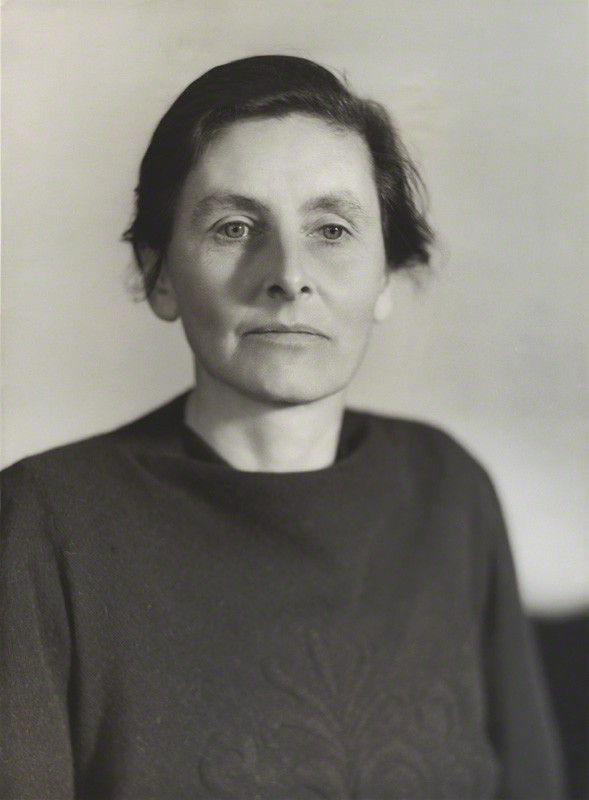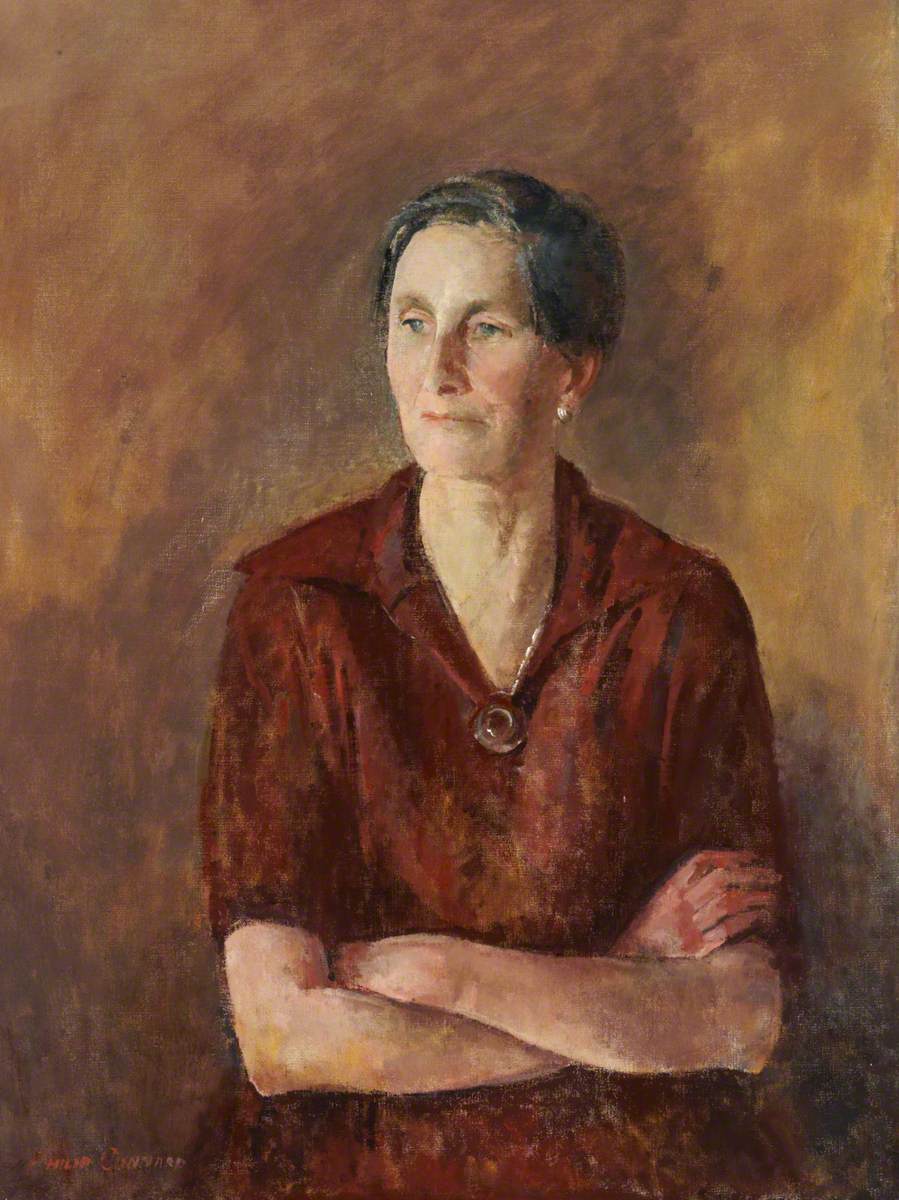Queer Places:
University of Oxford, Oxford, Oxfordshire OX1 3PA
Westfield College, 4 and 6 Maresfield Gardens, London NW3 5SU
 Mary
Danvers Stocks, Baroness Stocks (née Brinton; 25 July 1891 – 6
July 1975) was a British writer.
She was closely associated with the
Strachey,
the
Wedgwood and the
Ricardo families. Her family was deeply involved in changes in the
Victorian Era and Stocks herself was deeply involved in
women's suffrage, the
welfare state, and other aspects of social work.[1]
Mary
Danvers Stocks, Baroness Stocks (née Brinton; 25 July 1891 – 6
July 1975) was a British writer.
She was closely associated with the
Strachey,
the
Wedgwood and the
Ricardo families. Her family was deeply involved in changes in the
Victorian Era and Stocks herself was deeply involved in
women's suffrage, the
welfare state, and other aspects of social work.[1]
Mary Stocks was both friend and political ally to
Eleanor Rathbone
and
Elizabeth
Macadam. According to Stocks, after Rathbone and Macadam met at the
Committee of the Victoria Women’s Settlement, “Elizabeth Macadam became in
due course the friend and companion of Eleanor’s existence until death did
them part, and at no subsequent time was Eleanor lonely.” Lesbian feminist
historians have since been grateful for Stocks’ clue confirming the
importance of the passionate alliance between Rathbone and Macadam. Stocks,
as a close friend of Elizabeth and Eleanor, called on other close friends
such as Hilda Oakley and
Eva Hubback to contribute to
Rathbone’s biographical details.
Stocks was born in London, the daughter a
general practitioner, Roland Danvers Brinton. Politicians
Tim Brinton and
Sal
Brinton, Baroness Brinton are cousins of Mary Stocks.
Her mother Constance Rendel was related to Eleanor and Philippa
Strachey. She attended
St Paul's Girls' School. She campaigned for
women's suffrage, and joined
Millicent Fawcett's moderate
National Union of Women's Suffrage Societies (NUWSS) which later became
the
National Union of Societies for Equal Citizenship (NUSEC). She attended
the
London School of Economics (LSE), graduating in 1913 with a first-class
degree in Economics.[2]
She married the philosopher
John Leofric Stocks in December 1913. He was a fellow of
St John's College, Oxford. They had one son and two daughters.
During the First World War, Mary Stocks taught at the LSE and
King's College, London, while her husband served with in France with the
King's Royal Rifle Corps; he was awarded the
Distinguished Service Order..
She was a member of the NUWSS committee; she campaigned for
family allowances (finally granted in 1945) and for
birth control; she was also an editor of the NUSEC journal Woman's
Leader, supported the ordination of
women priests, and
equal pay for women. She also opposed restrictive women's clothing: as a
matter of practicality, she did not wear a hat or make-up, preferred flat
shoes, and kept her hair short. She became involved with the
Workers' Educational Association.

Mrs Mary Stocks (1891–1975), Principal of Westfield College (1939–1951)
Philip Connard (1875–1958)
Queen Mary, University of London
After the war, she moved to Oxford with her husband and taught economic
history at
Somerville College and
Lady Margaret Hall. The family moved to
Manchester in 1924, where her husband became a professor of philosophy.
Mary Stocks,
Eleanor Rathbone,
Alison Neilans,
Edith Picton-Turbervill and
Maude Royden were, as representatives of the NUSEC, among the delegates at the
tenth congress of the International Alliance of Women for Suffrage and Equal
Citizenship (IAWSEC) in 1926. The Board of the Alliance at the time was
presided over by Margery Corbett Ashby and included among the international
complement of its board members, Bessie Rischbieth of Australia who was also on
the Finance Committee. Rathbone was the ‘chairman’ of the international
committee on “Family Endowment or Allowances.” Alison Neilans represented
the Association for Moral and Social Hygiene. The international matrix at this
congress comprised hundreds of women, many of whom were self-declared
feminists and who represented national and international organisations. Dr.
Muthulakshmi Reddi was among the Indian delegates.
Stocks was a magistrate in Manchester from 1930 to 1936. The family moved again
to
Liverpool in 1937 where her husband was briefly vice-chancellor for 6
months.
After her husband died suddenly in 1937, Stocks moved back to London and
became secretary of the
London Council of Social Service. In 1939, she became Principal of
Westfield College where she remained, including a period when the
college was temporarily relocated to Oxford during the Second World War,
until she retired in 1951.
She served on a number of official government committees, often as the
only woman.
Stocks contested the
London University seat at the
1945 general election as an Independent Progressive. Her opponent was
the sitting MP who stood as an Independent supporter of the Churchill
government. She came within 149 votes of winning.
In 1946 Stocks contested a seat for the
Combined English Universities at a by-election as an
Independent candidate. The by-election was caused by the death of
Eleanor Rathbone (president of the NUSEC, whose biography Stocks wrote
in 1949). She was the runner-up amongst five candidates.
Stocks obtained wider public recognition in later life, when she became a
radio broadcaster and appeared frequently on
Any Questions?, on quiz shows and gave religious talks.[3]
She eventually retired to the
House of Lords, having been created a
life
peer as Baroness Stocks, of the
Royal Borough of Kensington and Chelsea on 17 January 1966,[4]
where she initially took the Labour Party whip before becoming a
cross-bencher in 1974. She wrote her autobiography.[1]
She was commissioned to write a book on the first 50th years of the WEA (Workers
Educational Association) which had been founded in 1903, published in
1953.[5]
She received several honorary doctorates, including ones from
Manchester University in 1955,
Liverpool University in 1956, and
Leeds University in 1957. She was a member of the advisory committee to
the
Anti-Concorde Project.
She died in Kensington in July 1975, shortly before her 84th birthday.
In 2017, she featured in a conference, London's Women Historians,
held at the
Institute of Historical Research.[6]
My published books:


BACK TO HOME PAGE

- https://en.wikipedia.org/wiki/Mary_Stocks,_Baroness_Stocks
- Conjugal wrongs don't make rights: International Feminist Activism,
Child Marriage and Sexual Relativism, by Carole Olive Moschetti, 2005
 Mary
Danvers Stocks, Baroness Stocks (née Brinton; 25 July 1891 – 6
July 1975) was a British writer.
She was closely associated with the
Strachey,
the
Wedgwood and the
Ricardo families. Her family was deeply involved in changes in the
Victorian Era and Stocks herself was deeply involved in
women's suffrage, the
welfare state, and other aspects of social work.[1]
Mary
Danvers Stocks, Baroness Stocks (née Brinton; 25 July 1891 – 6
July 1975) was a British writer.
She was closely associated with the
Strachey,
the
Wedgwood and the
Ricardo families. Her family was deeply involved in changes in the
Victorian Era and Stocks herself was deeply involved in
women's suffrage, the
welfare state, and other aspects of social work.[1]


